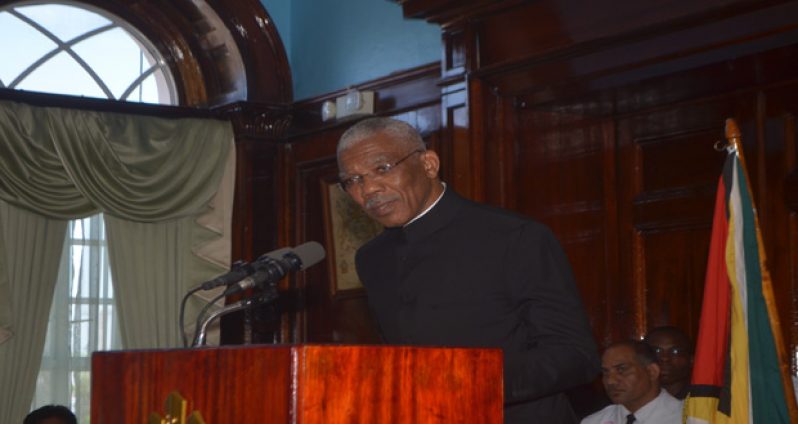President David Granger on Thursday laid out Guyana’s position on Suriname’s claim to the New River Triangle and while expressing confidence about the extent of this country’s territory, the Head of State asserted that there is at present a mechanism for addressing this matter and he is willing to continue a bilateral discourse. Suriname’s President Desi Bouterse last month told that country’s National Assembly that the New River Zone (Tigri) issue will be placed “back on the agenda.” The meaning of that statement is unclear; President Granger told the Parliament yesterday when he addressed MPs and diplomats. “Guyana, in view of the fact that there is at present a mechanism for addressing this matter, is willing to continue a bilateral discourse with the Government of Suriname on the matter of that country’s claims. That discourse, however, must be grounded on the principles of mutual respect and a repudiation of the use of force,” the Guyanese leader said.
Mr Granger also pointed out that Guyana has never been in doubt as to the shape or the extent of the territory to which it succeeded upon Independence on May 26, 1966. The Netherlands, he said could not have bequeathed to Suriname at that country’s Independence on November 25, 1975 what it did not possess. He said Guyana is confident that the boundary between Guyana and Suriname was definitively established by 1936. “There is an agreement as to what constitutes the territory of Guyana and what constitutes the territory of Suriname despite the fact that there is no formal treaty that encapsulates that agreement,” he said. President Granger said Suriname, in the absence of a formal treaty, sought to seize Guyana’s territory. Suriname’s claim was based on an arbitrary, municipal, legislative resolution passed in October 1965 by which the Staten changed the name of Guyana’s New River to ‘Boven Corantijin’ or Upper Corentyne.
No fear
“Guyana has no doubt about the soundness of the bases on which it exercises sovereignty of its territory. It has no fear in having Suriname’s claim to its territory resolved by an adjudicatory process,” the Guyanese Head of State said. The discourse, he said will be helped by ready access to the archival documents which are pertinent to the issues to be resolved. These documents, Mr Granger said must be open to both sides for scrutiny in order to determine that there has been full adherence to the principles of international law as they relate to sovereignty over territory.
Guyana has already made a large portion of its documents available to Suriname for its scrutiny, he told Parliament, and said it is hoped that the Suriname Government will do likewise by requesting the Netherlands Government to open the relevant Dutch Archives to facilitate research by both sides. Mr Granger said the British Archives are open to all and Guyana has nothing to hide.
“Suriname, if it is convinced that its claim can withstand legal scrutiny, should agree to take the matter before an internationally recognised adjudicatory body. Guyana is of the view that, if an agreement cannot be reached at the bilateral level within a given time-frame, the matter should be taken to adjudication so that this controversy can be concluded,” the President said. In the meantime, he noted that the governments of Guyana and Suriname can find a way of resolving its differences without acrimony or the use of force and in a spirit of cordiality. “We must bring finality to our difference in a permanent and internationally recognised legal manner,” he told the Parliament.
Suriname’s claim to New River Triangle Granger lays out conditions for bilateral talks …urges opening up of documents from Dutch archive
SHARE THIS ARTICLE :
Facebook
Twitter
WhatsApp



.jpg)








